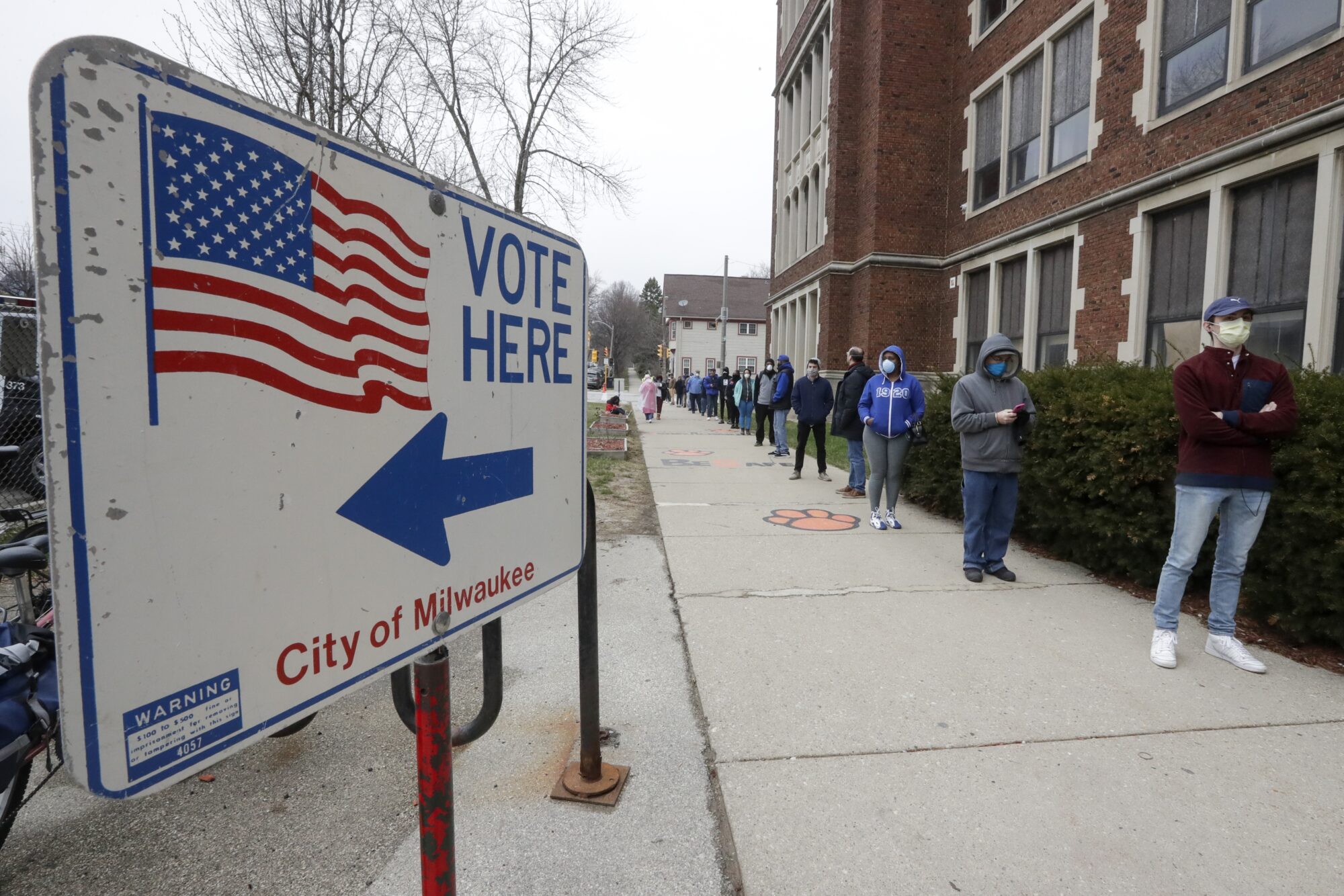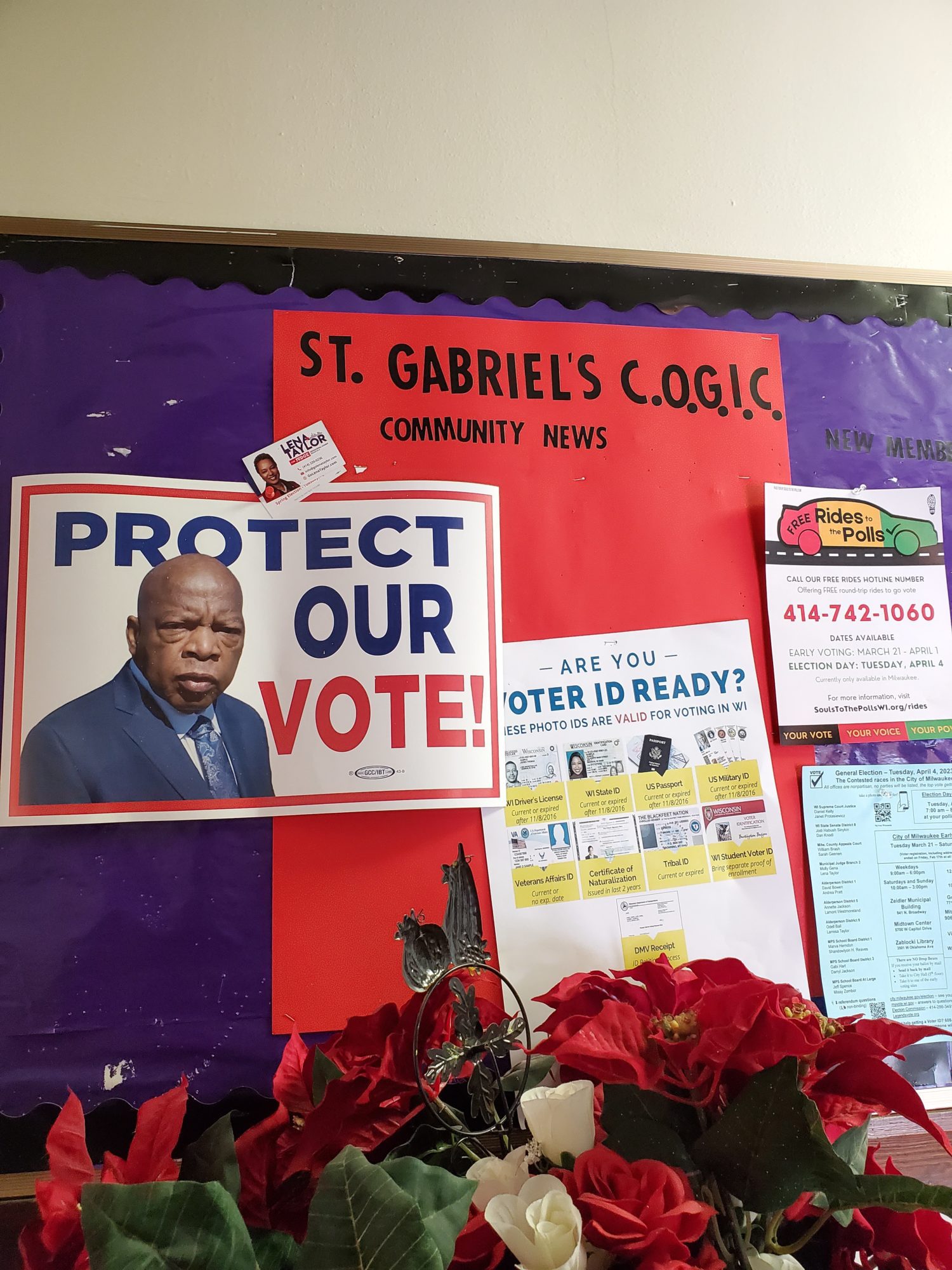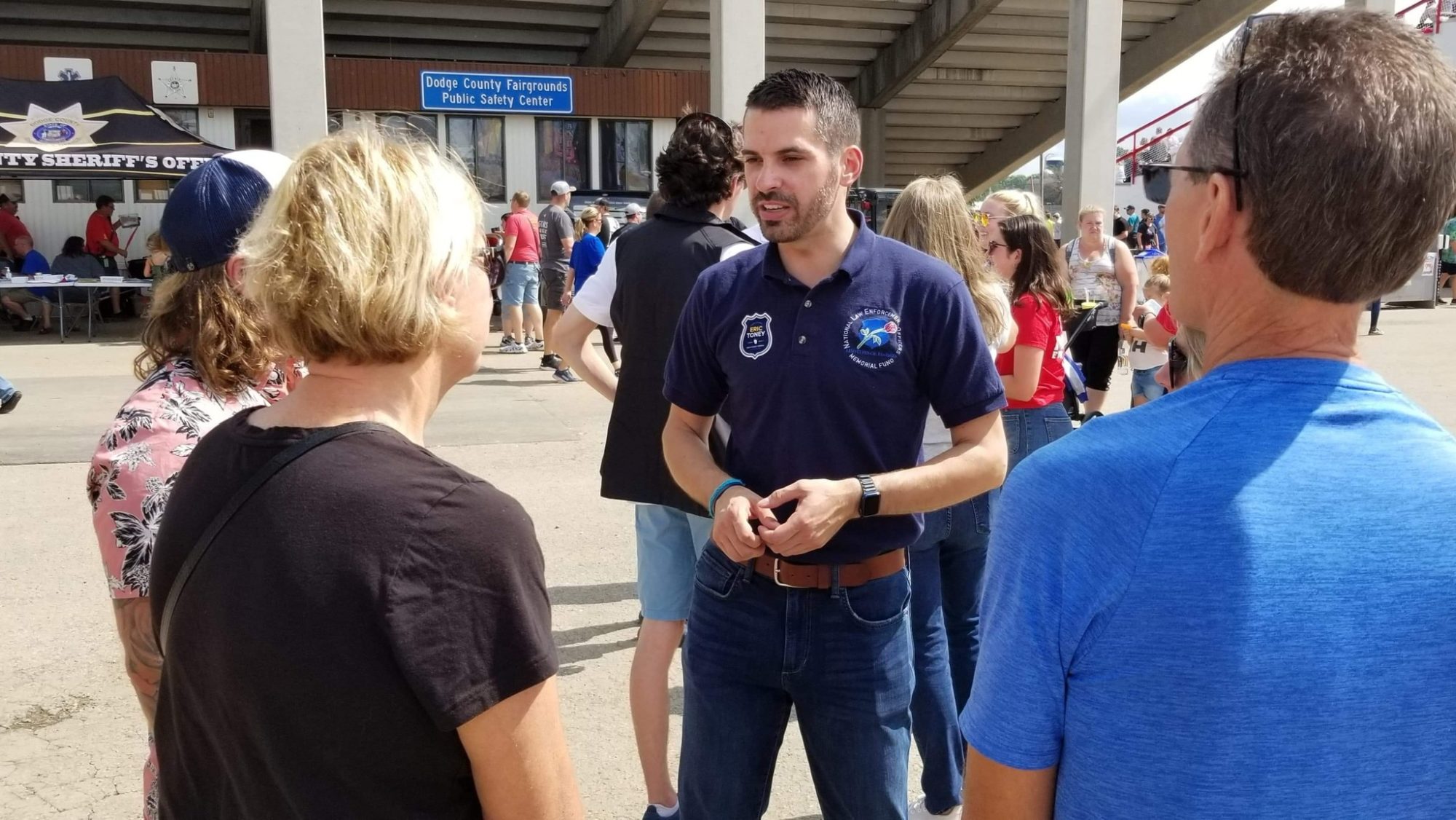Ballot Measure May Scare Away the People Who Help Run Wisconsin Elections
A quiet proposal on Wisconsin’s April 2 ballot would restrict who can assist with election tasks. Voting advocates worry it could alienate groups and volunteers needed to run the polls.
Alex Burness | March 21, 2024
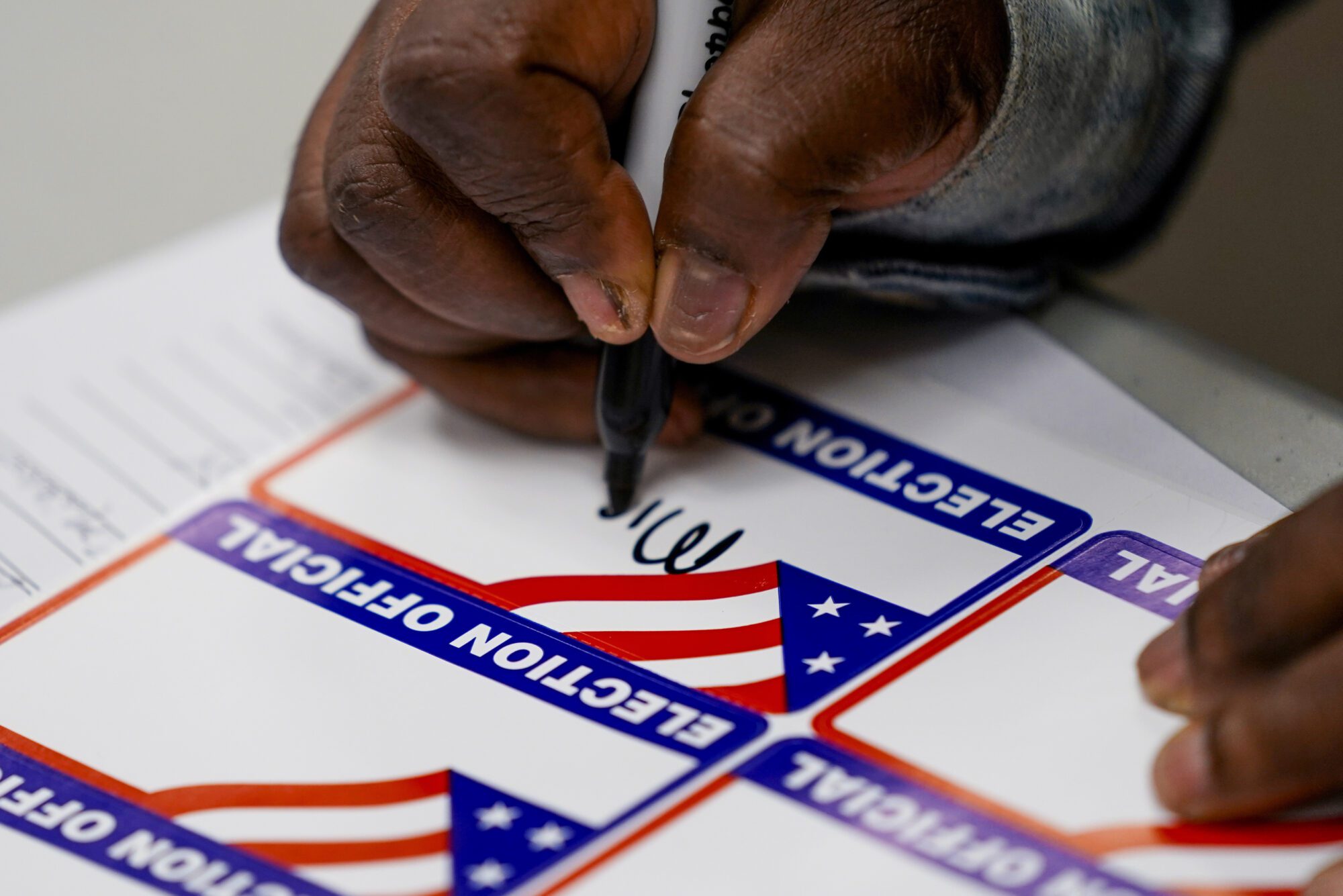

For the past two years, Nick Ramos has volunteered his time to ensure more Wisconsinites can participate in elections: with a mobile printer in hand, he visits polling places in the Milwaukee area to help people who lack proper identification obtain it on the spot, so that they are eligible to vote.
But Ramos, who directs the Wisconsin Democracy Campaign, an organization that promotes good government, says he may not volunteer in the future if voters approve Question 2, a constitutional amendment on the state’s April 2 ballot. “This thing gets passed, and I’d be very afraid to do that again,” he told Bolts.
The measure would require that only “an election official designated by law may perform tasks in the conduct of primaries, elections or referendums.” It can easily read as an innocuous codification of existing statute, and it has generated no campaign spending on either side of the issue since Republican lawmakers chose to place it on the ballot late last year.
Among advocates for voting rights and for well-resourced election administration, however, this under-the-radar proposal is alarming. A slew of lawyers, elections experts, and nonprofit leaders tell Bolts Question 2 is written so vaguely as to invite lawsuits over what constitutes a “task” and what, exactly, it means to help “conduct” an election.
They fear this confusion will have a chilling effect on the many non-governmental groups and volunteers who assist in election administration. If it passes, the measure is set to go into effect this year, ahead of November’s presidential election in which Wisconsin is again considered a critical swing state.
Victoria Bassetti, an expert on election law who has been involved in Wisconsin politics for three decades, believes this amendment would call into question the legality of any number of actions that these volunteers and outside organizations routinely perform in aid of the nearly 2,000 county and municipal clerks who run Wisconsin’s elections.
“It adds pretty substantial burdens and legal doubts onto the shoulders of hardworking local election administrators, who, faced with this new provision, are going to see help that they previously relied upon fade away, are going to face substantial litigation risks, and are going to be unable to call upon expert advice and help from a variety of fields, including IT, security, and ballot design,” said Bassetti, a senior advisor at States United Democracy Center, a nonpartisan group that advocates for ballot access.
“I do feel like people are treating it like an afterthought, but Question 2 is a big deal,” said Eileen Newcomer, who leads voter education efforts for the League of Women Voters in Wisconsin, “and the way that this question is phrased does lead to a lot of uncertainty about how it would be enforced.”
This measure appears alongside Question 1, a related constitutional amendment that would ban election offices in the state from accepting or spending money donated by outside, non-governmental groups. Both measures are part of the continued fallout of the 2020 presidential election, and the conspiracies about widespread election fraud that have characterized Republican politics—especially in Wisconsin—ever since. Democratic state lawmakers unanimously opposed placing Questions 1 and 2 on the ballot, arguing that the state should better finance elections before restricting outside aid.
Question 1 responds to a controversy that emerged in the fall of 2020, when a previously low-profile nonprofit called the Center for Tech and Civic Life distributed about $350 million, donated by billionaires Mark Zuckerberg and Priscilla Chan, to local elections offices around the country to assist in election administration at the height of the COVID-19 pandemic. These local offices, many underfunded and understaffed already, were scrambling at the time to outfit poll workers with personal protective equipment, establish drive-through voting, and process record levels of mail-in ballots.
Republicans were and still are outraged at the influx of cash, and have argued consistently that the donors intended to benefit liberal areas and boost turnout by Democrats, despite a lack of evidence of such favoritism or interference. Three and a half years on, this country’s response to the donation has been resounding: 27 states, most of which went for Donald Trump in 2020, have adopted bans on private funding for election administration. It would now hardly be groundbreaking if Wisconsin passes a ban of its own and becomes the 28th. (Wisconsin would have already joined this list, but for a veto by Democratic Governor Tony Evers in 2021.)
While Question 1 confronts outside money, Question 2 would affect the outside labor that goes into making elections run smoothly.
Among many examples of people who could arguably run afoul of the law if Question 2 passes, elections experts told Bolts, are representatives of voting-machine companies who commonly help troubleshoot during elections. And what about outside organizations who perform routine data analysis for local elections offices? Newcomer said that such work helps clerks decide how to spend limited resources—where to establish polling places, how to disperse staff, and so on.
Said Sam Liebert, a former clerk in three different small Wisconsin communities, “Some of these clerks are in towns and villages of 100 or 200 people, and they run elections out of living rooms and kitchens, and they have their 8-year-old daughters helping lick envelopes to send out absentee ballots. Where does this stop?”
Liebert, who now directs the Wisconsin branch of the national nonprofit advocacy group All Voting is Local, was leading elections in a town of about 12,000 people outside of Milwaukee during the 2020 cycle, and he said he relied on the assistance of folks who, under Question 2, could be seen as lacking the legal authorization to do that work in the future.
About 3,000 people in his town had requested absentee ballots that year for the November general election, and Liebert said he and his small staff could not alone have gotten the ballots sent out on time. He called in help from the town’s Parks and Recreation director and foreman, he said, and from technicians who are normally tasked with cleaning and maintaining park bathrooms and infrastructure. “We had an assembly line, getting ballots into envelopes and mail machines and getting them stamped,” Liebert said.
Wisconsin law already vests in local elections officials the power and responsibility to hire and train poll workers, and to discharge them if they break the law. Republicans who control the state legislature want to build upon this and turn the policy into a constitutional provision that could only be undone with another statewide vote.
But the law also has specific rules for who does and doesn’t qualify to be a poll worker; state statute lays out residency requirements and commands that workers undergo training before assisting in elections.
Should Question 2 pass, experts told Bolts, local clerks would have to be careful in deciding whom to call upon for help, and in making sure to remember to swear in as a poll worker anyone who performs a “task” of election administration—lest they slip up and find themselves lead characters in lawsuits.
But it won’t be enough, Bassetti said, for clerks to simply err on the side of caution by administering an oath of office whenever they fear they’re in a gray area. She said many would not meet the standards set by state statute, listing a wide range of workers she fears would be affected: “the IT consultant who’s there to help you troubleshoot, the security person who’s there to help you, the friendly school person who wants to help you organize things, or the ballot-design person helping you fit 17 things onto one sheet of paper,” among others.
During debate over the measures in November in the state Senate, Republican Senator Eric Wimberger argued this step was made necessary by foul play in Green Bay in 2020. Faced with extraordinary demands to execute an election amid a raging pandemic, the Green Bay city council created an ad hoc elections committee, which agreed to take $1.6 million from the Center for Civic and Tech Life, and also invited the guidance of several outside experts who helped the city plan for and hold its general election that year.
Green Bay’s clerk, however, clashed with that outside aid and wound up resigning, arguing she’d been marginalized by city leaders who favored outside expertise over her own.
The election was carried out without any reported irregularities. In a report issued in April of 2021, Green Bay’s city attorney absolved the city of any wrongdoing in the administration of the 2020 election, and furthermore found that the outside aid was much-needed. The report details intense challenges in Green Bay leading up to the election, with city officials overwhelmed and ill-equipped. “There was no way for the City to react to the changes brought on by the pandemic without the infusion of funding,” the report stated.
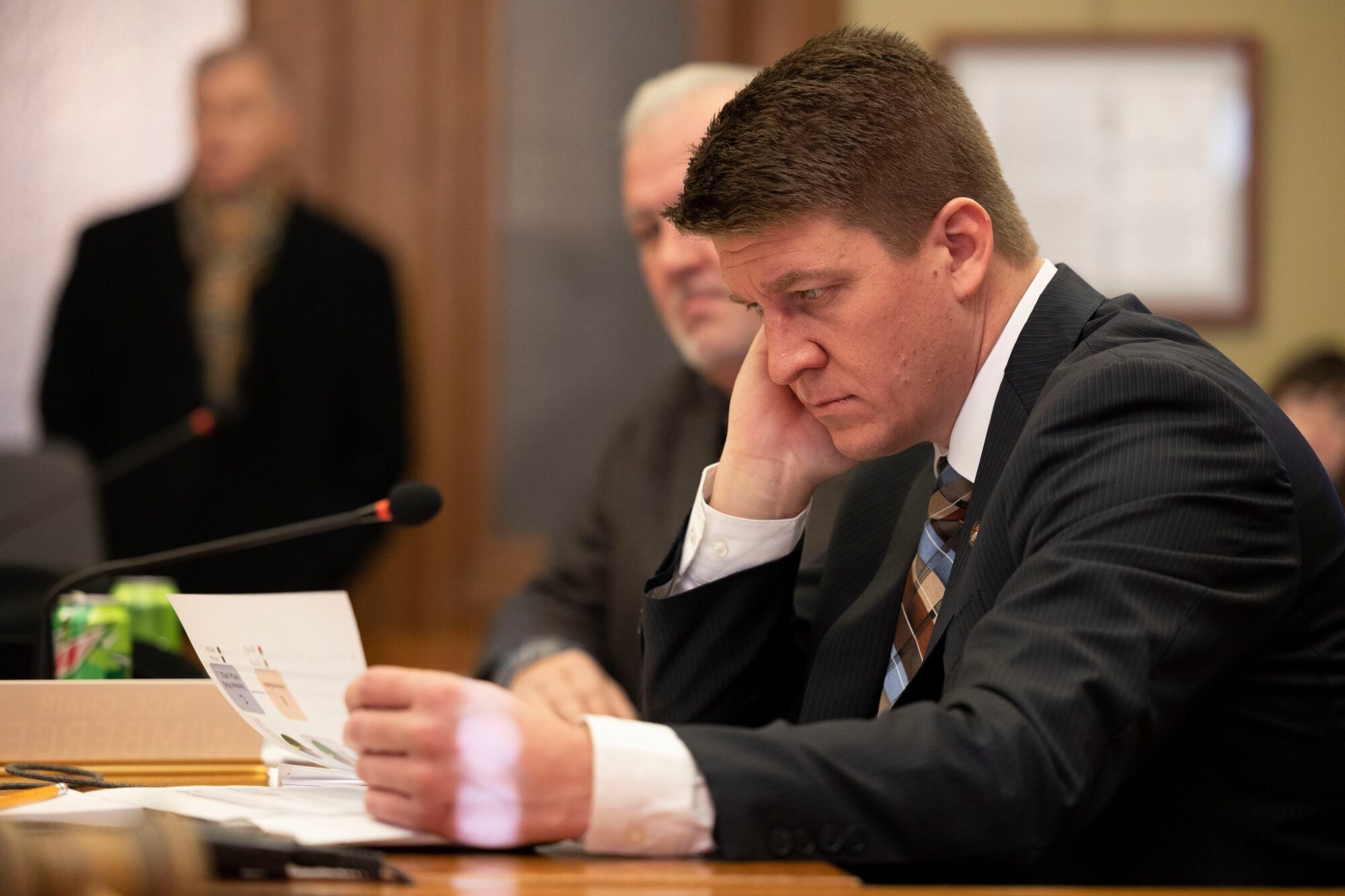

Three years after that report, the Green Bay episode remains the subject of Republican conspiracy theories, and is a primary motivator for Question 2 supporters in the legislature. Wimberger, who represents Green Bay, alleged from the Senate floor that in 2020 “activists orchestrated the fall election and acted as a city clerk would act, though paid by [the Center for Civic and Tech Life], including managing staff and having access to ballots.” He went on to suggest that the outside aid made Wisconsin’s 2020 election results untrustworthy. “Whether the actual ballots were altered or advantages went to one side remains unclear,” he said. “Suspicions remain.”
During that same Senate debate, Democratic legislators argued that Wisconsin Republicans were putting the state in an impossible position by both declining to substantially increase funding for local elections and limiting the ability of local administrators to seek help.
“You can’t have it both ways,” Democratic Senator Mark Spreitzer said. “You can either provide public funding for elections, or you can let clerks go out and find the resources they need to cover the gap. But you can’t choose neither.”
Advocates told Bolts the vagueness of Question 2 in particular could prove to be a feature, not a bug, for Republicans: by creating new avenues to prosecute people in election administration, they create opportunities to sow distrust and chaos.
“This only plays into the narrative that our system is broken, by making it more broken,” Liebert said.
That narrative has taken hold in prominent corners of Wisconsin politics. For one, court documents recently showed, lawyers in Wisconsin were central to Donald Trump’s effort to create a “cloud of confusion” in attempting to overturn election results in 2020. Since then, some law enforcement officials in Wisconsin have tried to use the powers of their office to investigate the elections, as Bolts has reported.
And election deniers continue to have sway in Wisconsin. A fake elector for Trump sits on the state’s election commission; another, Bill Feehan, is running for office in LaCrosse County in April. Trump supporters are also now trying to force a recall of Robin Vos, the staunchly conservative sitting Republican speaker of the Wisconsin House, over concerns Vos hadn’t done enough to help them decertify the state’s 2020 results.
David Canon, professor emeritus of political science at the University of Wisconsin, joined several others interviewed for this story in predicting that the exact boundaries set by Question 2 will have to be clarified in court, should the amendment pass. He identified several types of routine elections work that could feature in lawsuits challenging election results.
For example, Canon said, “What about helping disabled voters? Under state law a disabled person can have someone take them to the polling place and be with them when they vote. I think there will be a lot of people in the gray area who will have to be sorted out by subsequent litigation.”
This would all be avoided, of course, if Question 2 fails—but Wisconsin politicos told Bolts they’d be shocked by that outcome. In the absence of organized opposition, many of them said, the amendment should appeal to a wide swath of voters who take its language at face value and may miss the intentions of the measure’s authors.
“You have some folks that were pushing both of these constitutional amendments that are looking to try and sow seeds of doubt on our elections,” he said. “There’s going to be a lot of throwing things at the wall to see what sticks, by folks who’ve been pushing to poke and prod, and who’ll poke and prod some more now.”
Sign up and stay up-to-date
Support us
Bolts is a non-profit newsroom that relies on donations, and it takes resources to produce this work. If you appreciate our value, become a monthly donor or make a contribution.


